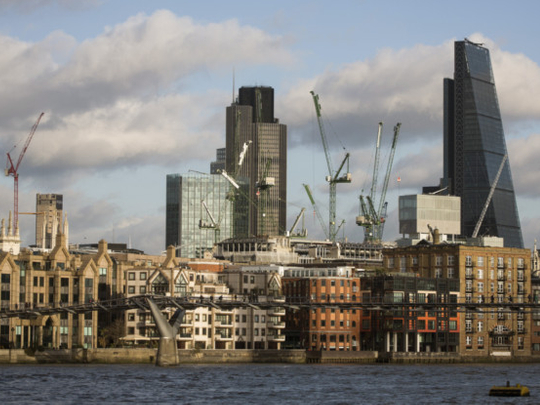
London does not need a mayor; it needs a prime minister. Britain is fracturing. Scotland may yet quit the union and England turn its back on Europe. The Conservatives are throwing up barricades against the immigrants who are the capital’s lifeblood. The world’s most vibrant capital city cannot entrust its fate to a little England. This is a moment to imagine a different future: Independence.
Boris Johnson, the present Mayor, says he too wants power shifted from Westminster to City Hall. His demands — for a tad more financial autonomy and oversight of the courts — are piffling. Unsurprisingly so. Johnson will soon vacate City Hall for the House of Commons. He aches to replace Prime Minister David Cameron in Downing Street. Johnson’s loyalties to London count for nothing against consuming ambition.
The economics of independence speak for themselves. With a population of 8.5 million (closer to 13.5 million in the wider metropolitan area) London accounts for more than a fifth of Britain’s gross domestic product and generates as big a chunk of its tax revenues. This gives it an economy about the size of Sweden. Unemployment is less than 3 per cent; the demographic profile is more youthful than in the rest of the United Kingdom. Tourists spend £20 billion (Dh115.4 billion) each year in the capital.
The metropolis has become a hub for high-value global businesses reaching well beyond its traditional role as a pre-eminent centre for financial services. It is the chosen home of the footloose super-rich and those at the bottom of the pile with the energy and grit to lift themselves out of hardship. London hums with enterprise, energy and people having fun. For those who do not fret about the ethnicity of their neighbours, it is a great place to live.
Less well-understood is that the capital has all the other attributes of a modern state: A natural frontier, superb transport links, first-rate education and health networks, unrivalled heritage and cultural centres — even a ready-made head of state. Then there are the six first-class football teams in the Premier League and the spiritual homes of cricket and rugby at Lord’s and Twickenham. Sure, independence would leave some rough edges. Assets and debts would have to be fairly allocated between the separating parties. London can afford to be generous.
The M25 orbital motorway is the ready-made frontier, providing access into the city and fast connections to the rest of England. The road’s on and off ramps are perfect sites for border control posts, though, in this the digital age, electronic surveillance and recognition devices would replace old-fashioned immigration queues. The identity chips now embedded in passports could readily be adapted for car windscreens.
Heathrow, of course, is scarcely a good advertisement for a 21st century city state. But, under a new management, it could be turned into a half-decent airport. The rest of England would inherit Gatwick as the entry point for airlines to the south-east. Passenger ferries from London to the rest of Europe would run from the Thames port of Tilbury, while Dover devolved to the rump England.
With its boroughs and town halls, London has the political infrastructure for a new democracy. Their electoral registers would determine eligibility to vote in an independence referendum. Assuming a Yes — I cannot imagine any other possibility — a new parliament would be established at Westminster. London would eschew centralised government, adopting instead a federal constitution modelled on the one British officials wrote for the German Federal Republic. The city would thus recall a lesson Britain has forgotten: Power is best exercised close to the people. Queen Elizabeth would retain her home at Buckingham Palace as the city state’s constitutional monarch. Membership of the Commonwealth would follow.
The new state would join the European Union (EU), lifting the threat to the health of its global financial institutions and other professional services. Free of the influence of the europhobes (Nigel Farage’s UK Independence Party scores badly in the capital), it would join the border-free Schengen area, ensuring its doors remained open to Polish doctors, Italian designers and French mathematicians. For a time, at least, London would keep the pound. The rest of England would be free to share the currency.
Thus liberated, the capital would recognise that diversity is its strength. The children already doing most to raise standards in its schools are the offspring of first-generation immigrants. For non-EU citizens, there would be a liberal, points-based immigration regime to attract the best and brightest from around the world and match employment openings with skills.
Special arrangements would operate for workers travelling into the city from England. This should not be a problem. Britain already has an open borders model in the common travel area with Ireland. If England chose to build a fence on its side of the M25, however, its citizens would have to compete with Indian IT engineers and Brazilian entrepreneurs for work permits in London.
Doubtless, the pinched English nationalists of Ukip and anti-immigration pressure groups would cry foul. Their vision of statehood, fixated on the proportion of the population that is “white”, is confounded by London’s success. Saloon bar bores in the home counties can be left to their anguished debates about identity. Londoners should break free.
— Financial Times











